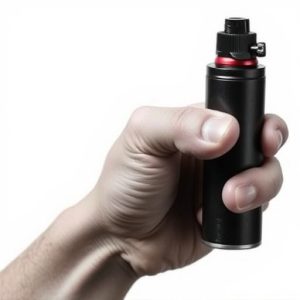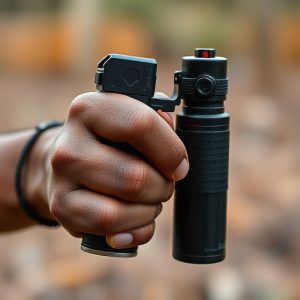Mastering Pepper Spray Safety: Expiry Date Checks & Alternatives
TL;DR:Regularly checking your pepper spray expiration date is crucial for personal safety. Unlike fo…….
TL;DR:
Regularly checking your pepper spray expiration date is crucial for personal safety. Unlike food, pepper spray doesn't have a standardized expiration, but manufacturers advise replacing it after 3-5 years. Degradation due to chemical breakdown or environmental factors can reduce its effectiveness. Look for 'use by' or 'expiration' dates, inspect for damage or reduced potency, and store in cool, dry conditions to maintain viability. Failure to check could result in ineffective self-defense during emergencies.
“Discover the power and limitations of non-lethal inflammatory self-defense tools, particularly pepper spray. This comprehensive guide delves into crucial aspects often overlooked, such as understanding its composition, ensuring regular expiry date checks, and identifying common issues causing premature degradation. Learn how to stay prepared with up-to-date self-defense options. Additionally, explore alternative non-lethal solutions for personal safety. Remember, knowing your pepper spray’s expiration date could be a matter of safety.”
- Understanding Pepper Spray: Its Composition and Effects
- The Importance of Regular Expiry Date Checks for Self-Defense Tools
- How to Determine the Expiration Date on Your Pepper Spray
- Common Issues Causing Pepper Spray To Go Bad Before Its Time
- Alternative Non-Lethal Inflammatory Self-Defense Options
Understanding Pepper Spray: Its Composition and Effects
Pepper spray, a non-lethal inflammatory self-defense tool, is designed to incapacitate an attacker temporarily. Its primary active ingredient is capsaicin, the same compound that gives chili peppers their heat. This chemical irritates the eyes, nose, and respiratory system, causing temporary blindness, coughing, and difficulty breathing. The spray also comes with a variety of other ingredients to enhance its effectiveness and stability, including preservatives and surfactants.
Regular maintenance and proper storage are crucial for ensuring pepper spray remains effective. One essential aspect often overlooked is the expiration date check. Unlike food items, pepper spray doesn’t have a specific best-before date labeled on it. However, manufacturers usually recommend replacing it after 3 to 5 years. Regular testing of the spray’s potency is also recommended to ensure its effectiveness when needed. Always keep the spray in a cool, dry place away from direct sunlight to prolong its lifespan.
The Importance of Regular Expiry Date Checks for Self-Defense Tools
Self-defense tools, such as pepper spray, are essential for personal safety and security. However, their effectiveness diminishes over time due to chemical degradation and potential exposure to varying environmental conditions. Therefore, conducting regular pepper spray expiry date check is paramount. Users should be diligent in inspecting the expiration dates on their self-defense devices, ensuring they remain within their valid period of use.
Neglecting this crucial step can lead to a situation where an individual relies on outdated or ineffective pepper spray during an emergency. It’s not just about checking the date; it’s also understanding the quality and performance guarantees offered by manufacturers. Staying proactive in managing expiration dates helps ensure that self-defense tools are reliable when needed most, providing users with peace of mind and the confidence to defend themselves.
How to Determine the Expiration Date on Your Pepper Spray
Checking the expiration date on your pepper spray is crucial for ensuring its effectiveness and safety. Unlike some medications, there’s no universal standard for pepper spray expiration dates, so it’s up to users to be vigilant. Look for a ‘use by’ or ‘expiration’ date printed on the canister, which usually appears alongside batch numbers and manufacturing details. This date signifies when the spray is guaranteed to maintain its full potency.
After this date, the chemical composition of the pepper spray may begin to deteriorate, reducing its impact. While some users believe that shaking the canister can rejuvenate its power, it’s not a foolproof method. Regularly inspect your pepper spray and consider replacing it if it’s past its prime or shows signs of damage, ensuring you’re prepared for any potential situations.
Common Issues Causing Pepper Spray To Go Bad Before Its Time
Pepper spray, while a popular choice for self-defense due to its non-lethal nature and quick disabling effects, can degrade in quality over time, leading to reduced effectiveness or even spoilage before its intended expiration date. Several factors contribute to this issue, making it crucial for users to be aware of potential problems and how to prevent them.
One of the primary reasons pepper spray goes bad is exposure to moisture and varying temperatures. Extreme heat can accelerate the chemical reaction within the canister, causing the active ingredient, capsaicin, to degrade faster. Conversely, high humidity levels can lead to condensation inside the container, which, when combined with temperature fluctuations, creates an environment conducive to bacterial growth and spoilage. Additionally, improper storage, such as leaving it in direct sunlight or extreme cold, can compromise its integrity. Regularly checking the expiration date and storing pepper spray in cool, dry places is essential to ensuring its viability when you need it most.
Alternative Non-Lethal Inflammatory Self-Defense Options
When considering non-lethal inflammatory self-defense tools, there are several options beyond traditional pepper spray. These alternatives offer unique advantages for different situations and user preferences. For instance, CS gas canisters and tear gas bombs provide a broader range of protection against aggressive attackers by causing temporary blindness, coughing, and difficulty breathing. However, these options may not be as widely available or legal in all jurisdictions as pepper spray.
Regularly checking the expiration date on your self-defense tools is crucial, especially for those relying on products like pepper spray. Unlike some other non-lethal weapons, pepper spray has a finite shelf life; typical expiration periods range from 2 to 3 years. Using expired spray might reduce its effectiveness during an emergency situation, so it’s essential for users to stay vigilant and replace their supplies promptly. This simple step can ensure that your self-defense mechanism remains reliable when you need it most.
In the pursuit of personal safety, staying informed about the longevity and effectiveness of self-defense tools like pepper spray is paramount. Regularly checking the expiry date, understanding composition, and recognizing potential issues ensure optimal performance when it matters most. While pepper spray remains a popular choice, exploring alternative non-lethal options broadens your defensive arsenal. Armed with knowledge, you can make informed decisions to protect yourself, staying one step ahead of potential threats. Remember, a proactive approach to self-defense is key, and understanding your tools is the first line of defense.


